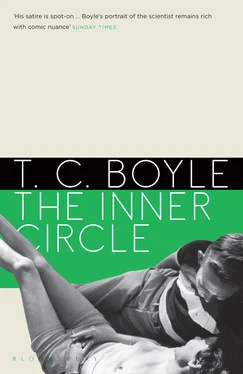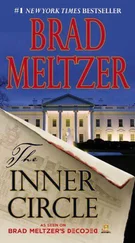“Who?” Do not react, I kept telling myself. Let nothing show.
“McGahee.”
I was puzzled. “Who’s McGahee?”
A look of incredulity. “The guard!” he shouted. “The fat fuck of a guard.”
Another long pause. If I’d screamed through a megaphone no one would have heard me.
“I’m going to croak him. Tonight.” He glanced once over his shoulder at the door and the olive-drab blanket hanging like an arras over the peephole and then pulled a sliver of honed blue steel from the waistband of his trousers, and what was it, a spoon worked to a point, the fragment of an iron bed frame, the blistered head of a meteor flung down out of the heavens? Metal, steel. He had it — here, in prison. The man held it there in the light of the freestanding lamp I’d set up along with the desk and chairs. There was an edge to that steel, and it caught the light in a quick sharp gleam of menace.
“Going to shank him,” he breathed, and now I was in on it too, complicit, one of his soldiers, one of his gang. “The fat fuck,” he added, for emphasis, even as he rose from the table, pocketed the two unopened packs of cigarettes, and moved to the door so he could hammer the cold slab of steel with the underside of his fist and roar out to the guard at the end of the hall: “Open up down there! This here innerview is quit!”
Of course, I bring this up because of the moral dilemma with which it presented us. I was numb through the next two interviews — I got the boxer next, and then the chief Mexican — and the minute we climbed back into the car, I opened myself up to Prok and Corcoran. The fog had closed in on us, and we sat there in the cab of our rental car as if we were prisoners ourselves, confined forever, confined to this, to these questions and this procedure, and the confidences that weighed on us like a judgment. I wanted to scream. Wanted to turn to Prok and bawl till there was no air left in my body.
Prok sat stiffly beside me, so close our thighs were touching; Corcoran was on the other side of me, gazing out the window into the opacity of the atomized light. Prok had been about to start up the car, all business, all hurry, but he paused now, his hand arrested on the key he’d inserted in the slot of the ignition. “I see your dilemma, Milk,” he said after a moment. “But it could be a test, you realize that, don’t you? If word should get back that we’ve broken confidentiality, then we’ll be washed up here — or in any other correctional facility, for that matter.”
“But a man’s life could be at stake — the guard.” I named him, and it was like reading a name off a tombstone: “McGahee.”
Prok had dropped his hand from the ignition. The fog breathed at the windows. “No,” he said finally, “we can’t do it, no matter whose life might be at stake. It’s regrettable, no doubt about it, and I wish it hadn’t come up at all, but we just cannot compromise the project. And, too, it may well be a test, never lose sight of that. Corcoran, you’re in agreement? Milk?”
As it turned out, no one was murdered that night. Or the next night either. To the best of my knowledge, none of the guards was assaulted in all the time we were connected with San Quentin, during that visit and subsequent ones as well. I thought of that Negro, with his dirty shaft of steel and the eye that wouldn’t hold — I think of him now — and wonder if Prok wasn’t right after all. It was a test. That’s all it was. A test.
But then we were on to Berkeley and what has to have been the single defining moment of all my years with Prok: the grand lecture in the field house, attended by no less than nine thousand souls. We were fresh from our confinement at San Quentin — one-on-one in the silent sweating depths, at a remove from everything life has to offer — and now we were on the familiar turf of a university campus, exposed to all the world, nine thousand of the unincarcerated and free-breathing, students and faculty alike hurtling over one another to have a chance to hear the world’s leading authority speak on the one subject that held more fascination than anything their books and philosophies could ever hope to reveal.
I don’t recall the weather. It might have been raining, that sheer relentless outpouring typical of the wet season in California, but that might have been another time and another place altogether. I do remember the hall, though. Or rather the field house. This was more usually the scene of intercollegiate basketball games, but now, because of the uncontainable enthusiasm for Prok, Prok the author, the celebrity, the annihilator of sexual taboos, it had been given over to us for the afternoon. All seven thousand seats had been taken some two hours before the lecture was scheduled to begin, and even as we arrived university officials were scrambling to set up an additional two thousand folding chairs in the aisles and on the floor of the basketball court itself. Can I say that excitement was high, and leave it at that?
We were escorted to one of the coaches’ offices, in a side door and down a cordoned-off hallway, where the man who was to introduce Prok — the vice president of the university, no less — urged us to make ourselves comfortable while he went off to see to the final details. “We’ll need ten minutes or so,” he said, and I have no recollection of him whatever, so I’ll assign him the shrewd narrow features and evasive eyes of the congenital bureaucrat, “and please, if there’s anything I can do for you, just holler.” And then he shut the door and left us to ourselves.
“Quite the elegant dressing room, eh?” Prok said, turning to us — to Corcoran, Mac and me. We looked round us. The room was cramped, piled high with athletic equipment, mismatched sneakers, yellowing volleyballs, bats, spikes, mitts, rackets, helmets and the like, the walls all but obscured by team photos and two towering bookcases sagging under the weight of their collective trophies. The smell — of the adjoining locker room, of the distilled and rancid sweat of the generations — brought me back to high school and a reverie I’d had after my concussion on the football field. They’d brought me into the locker room on a stretcher, my mother’s voice floating round the door like a bird battering its wings against a pane of glass, my consciousness fading and then looping back on itself till the world opened up on me like a woman’s smile, though there was no woman there, only the grim bald-headed team physician, administering smelling salts.
“Yes,” Mac said, “and you see what your celebrity gets you? Next thing they’ll be putting us up at the Ritz, Prok. Just you wait.”
We laughed, all of us, though Prok’s laugh was more of a whinny and his eyes jumped from one of us to another, as if we’d all collectively spoken. Was he nervous? Was that it?
At that moment, as if in response to my question, the building seemed to shake with the vast stirring of the crowd just beyond the door and down the corridor. Thousands of undergraduates had simultaneously stifled a yawn, shifted in their seats, elevated their voices so as to be heard over the building expectant hum of the crowd.
Mac had moved to Prok’s side, the two of them poised there in the center of the room as if listening to the rumble of distant thunder. “Can I get you anything?” she asked, her voice muted. “Coffee? A glass of water? Cola?”
He seemed to hesitate — Prok, who never hesitated, never wasted words or motion — and then, so softly I could barely hear him, he said: “Water.”
“Good,” Mac murmured. “I thought you’d be dry, Prok — you’ve got to keep your throat lubricated, you know. I hate to say it, but you’re almost like a star tenor at the Metropolitan — or a radio host.” She turned and gave Corcoran and me a look.
Читать дальше












